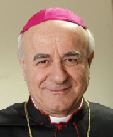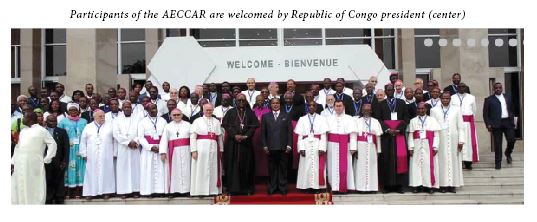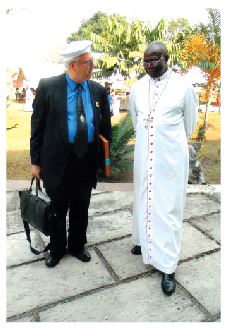 The 10th Plenary Assembly of the AECCAR (Association of Episcopal Conferences of the Central African Region) took place from July 6 to 13, 2014 in Brazzaville, Congo. The theme was: “The Family in Africa Today”, in preparation for the Synod on the family, which will be held in Rome in October 2014. The AECCAR included conferences of Catholic Bishops from the six countries in the Central African region: Congo, Cameroon, Central African Republic, Gabon, Equatorial Guinea and Chad. Of the one hundred plus distinguished participants, there were more than fifty bishops, some archbishops and a cardinal, several priests, experts from various fields, as wall as a number of married couples.
The 10th Plenary Assembly of the AECCAR (Association of Episcopal Conferences of the Central African Region) took place from July 6 to 13, 2014 in Brazzaville, Congo. The theme was: “The Family in Africa Today”, in preparation for the Synod on the family, which will be held in Rome in October 2014. The AECCAR included conferences of Catholic Bishops from the six countries in the Central African region: Congo, Cameroon, Central African Republic, Gabon, Equatorial Guinea and Chad. Of the one hundred plus distinguished participants, there were more than fifty bishops, some archbishops and a cardinal, several priests, experts from various fields, as wall as a number of married couples.
The speaker on Monday, July 7, was Marcel Lefebvre, Director of the Pilgrims of St. Michael of Rougemont, Quebec, Canada, invited guest of Father Prosper Mesmin Massengo, General Secretary of AECCAR. Mr. Lefebvre was able to speak for one hour to all the participants. (See his report at the end of this article.)
We share with you excerpts from the extensive discourse given by Bishop Vincenzo Paglia, president of the Pontifical Council for the Family and special envoy of Pope Francis. He is President of the Pontifical Council for the Family, whose theme is “The Family, Resource of Society and Gospel to the World”:
Saint John Paul II, pope of the family, as he himself wanted to be called, said; “The future of the world and of the Church passes through the family, the first cell of the living ecclesial community, but also of society.” The family has now become a major concern for Pope Francis, whom I believe, needs our support in order to transform society, by bringing the Gospel to families, because Africa is not on the sidelines of globalization, and must preserve family values, the treasure and resource of society and of all of mankind…
In an Africa which is buffeted by diverse currents, to defend the family, as God Himself desires it, is not just an act consistent with the faith... it is to preserve the very foundations of society and any tangible development. The threats, however, which rage against the family today in Africa are diabolical: dissolution of morals, attacks on the unity of marriage; the loosening of ties between family members; the proliferation of de facto unions, not to mention poverty, rising unemployment which does not allow parents to properly assume their responsibilities...

What is the underlying reason for this crisis? It is cultural. Never has the family been so dramatically hit as it has in the past fifty years. The growing importance in Western societies of individual freedom, a value that we should all be proud of course, has had the effect, however, of strengthening exaggerated individualism, at the expense of long-term and stable relationships... Considering the findings of Italian researcher, Volpi, on the given statistics on marriage in Italy, causes us to wonder. While “marriage and the family follow the same curve of a plummeting airplane”, the study indicates that the number of single parent homes has risen from 5.2 million families in 2001 to 7.2 million in 2011. This means that the decline of religious and civil marriages has not changed into new forms of community life, which are also more than fragile, but in an increasing number of people choosing to live alone. This means that any kind of lasting bond is experienced as an unbearable thing...
It was calculated that, in France, one in three people have chosen to live alone, while the average was one in ten (Patrick FESTY, in Commentaire, 2013, #’s 142, 289) forty years ago. Moreover, the absolute exaltation of the individual, freed of any bonds, can only lead to the destruction of society and disintegration of all forms of solid, lasting relationships.
Hence arises the urgent need to give back to the family its cultural dignity and its central role in society. The family must be at the very heart of the debate, the very center of the political and economic vision, and also in the Christian community. A globalized society will only be able to find a civilized future in the extent that it will be able to promote a culture of family, redesigned as the vital link between the happiness of the private sphere with that of the public sphere.
 In any event, the family is not dead. Despite the very difficult time that it is going through, it remains the most important resource available to contemporary society. It is a resource because it creates real relationships; which no other life-form is capable of creating. The family is unique in its ability to generate relationships. Its genome does not cease to exist because it is what most humanizes society...
In any event, the family is not dead. Despite the very difficult time that it is going through, it remains the most important resource available to contemporary society. It is a resource because it creates real relationships; which no other life-form is capable of creating. The family is unique in its ability to generate relationships. Its genome does not cease to exist because it is what most humanizes society...
The family therefore, remains the most valuable resource to society; where we learn the decisive importance and sense of who we are, in the building up and maintaining of a more just and more cohesive society. It is in the very bosom of the family that it finds its continuity in the birth of children, and thus the link between generations. The claim that marriage between anyone can be possible because there is love, is a claim that, nothing has been understood of the difference of conjugal love, which includes the ability to create.
“I was invited by Father Mesmin Prosper, general secretary of the Association of Episcopal Conferences of the Central African Region (AECCAR), to attend the Tenth Plenary Assembly of the AECCAR being held in Brazzaville, Republic of Congo. the Most Rev. Anatole Milandou, Archbishop of Brazzaville, gave us a royal welcome.
“A dozen bishops from the six countries of the AECCAR, who had already attended our Week of Study in Rougemont, Quebec, Canada, were also present. To mention a few: Bishop Anatole Milandou, Bishop Samuel Kleda, President of the Episcopal Conference of Cameroon and new president of the AECCAR, Bishop Louis Portella, President of the Episcopal Conference of Congo-Brazzaville and past president of the AECCAR, Bishop Matthew Madega, President of the Episcopal Conference of Gabon, and Mot Rev. Jean Cardin, Bishop of a diocese of Congo-Brazzaville.”
For nearly an hour at this important meeting, Marcel Lefebvre spoke to them about Louis Even, founder of the Pilgrims of St. Michael and about his important work for Social Justice. He clearly exposed the actual cause for the many economic problems, which prevent families from thriving in Africa, and throughout the world. This being also the leading cause for a great number of souls being lost, as was pointed out by both Pope Benedict XV and Pope Pius XI. After Mr. Lefebvre spoke, Bishop Samuel Kleda and others asked him some very pertinent questions on social justice, and their conversation continued on through their dinnertime.
All week long, Mr. Lefebvre had ample opportunity of distributing documentation, and it was a great privilege for him to meet with all the participants of the Conference, who graciously received the liberating and hopeful message of the Pilgrims of St. Michael. Bishop Matthew Madega of Gabon has come to Rougemont twice already and he is returning again in August of 2014. He personally worked to make it possible for the Pilgrims of St. Michael to participate in the Plenary Assembly of the AECCAR. We are confident that this great event will benefit the advancement of our cause in this battle for social justice.” v